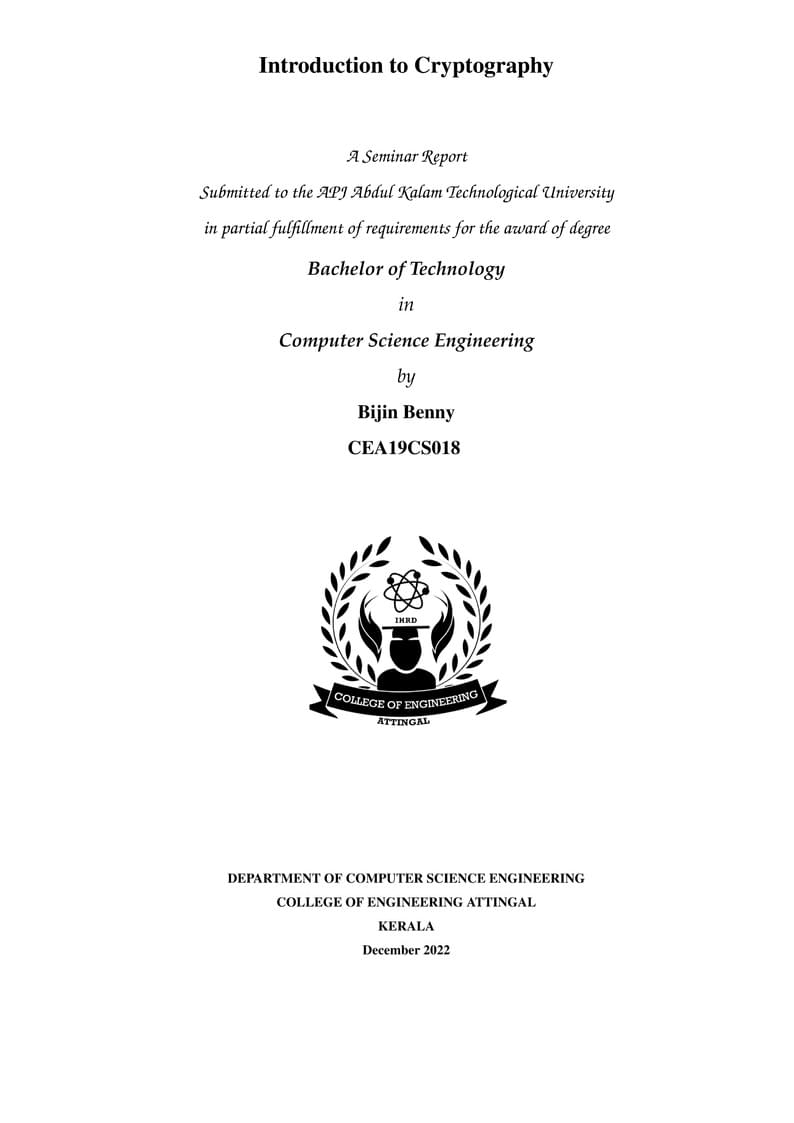
KTU BTech Seminar Report template
Auteur:
Bijin
Last Updated:
il y a 3 ans
License:
Creative Commons CC BY 4.0
Résumé:
KTU Smeinar Report

\begin
Discover why over 25 million people worldwide trust Overleaf with their work.

\begin
Discover why over 25 million people worldwide trust Overleaf with their work.
\documentclass[12pt,a4paper]{report}
\usepackage{graphicx}
\usepackage{amsmath}
\usepackage{fancyhdr}
\usepackage{cite}
\usepackage{framed}
\usepackage{a4wide}
\usepackage{float}
\usepackage{epsfig}
\usepackage{longtable}
\usepackage{enumerate}
\usepackage{afterpage}
\usepackage{multirow}
\usepackage{ragged2e}
\usepackage{gensymb}
\usepackage{amsfonts}
\usepackage[left=3.5cm,top=1.5cm,right=3cm,bottom=4cm]{geometry}
\usepackage{setspace}
\usepackage{float}
\usepackage{txfonts}
\usepackage{lipsum}
\newcommand{\Usefont}[1]{\fontfamily{#1}\selectfont}
\usepackage{lscape} % for landscape tables
\renewcommand{\baselinestretch}{1.7}
\usepackage{blindtext}
\usepackage{xpatch}
\usepackage{url}
\usepackage{leqno}
\usepackage{subcaption}
\linespread{1.5}
\usepackage[intoc, english]{nomencl}
\hyphenpenalty=5000
\tolerance=1000
\usepackage[nottoc]{tocbibind}
\bibliographystyle{IEEEtran}
\renewcommand{\bibname}{References}
%*******************************************************************
% Header and Footer
% This is not required in Technical reports submitted to CET ECE department.
% Please leave it commented
%*******************************************************************
%\pagestyle{fancy}
%\fancyhead{}
%\header and footer section
%\renewcommand\headrulewidth{0.1pt}
%\fancyhead[L]{\footnotesize \leftmark}
%\fancyhead[R]{\footnotesize \thepage}
%\renewcommand\headrulewidth{0pt}
%\fancyfoot[R]{\small College of Engineering Trivandrum}
%\renewcommand\footrulewidth{0.1pt}
%\fancyfoot[C]{2020 - 2021}
%\fancyfoot[L]{\small Title of the Seminar/Project}
%*******************************************************************
%*********************Figures*****************************
% Save all figures in the folder figures and include them in your
% report using the command \includegraphics{figure-name}
\graphicspath{{figures/}}
% figure files can be in jpeg,jpg, png or pdf formats
%*******************************************************************
\begin{document}
%****The entries in this section are to be filled in by the student with appropriate values *************
% These values are used thoroughout the report
% please fill in the appropriate values
\gdef \title{Introduction to Cryptography } % Seminar title
\gdef \author{Bijin Benny} %student name
\gdef \dept{Computer Science Engineering} %Department
\gdef \degree{Bachelor of Technology} %degree
\gdef \branch{Computer Science Engineering} %branch
\gdef \college{College of Engineering}
\gdef \collegeplace{Attingal}
\gdef \rollno{CEA19CS018} %KTU Reg No
\gdef \deptabbr{Dept.of CSE} %Dept name abbreviation
\gdef \guide{MS. Syama S.R} %Seminar guide
\gdef \guidedes{Assistant Professor}%Seminar guide designation
\gdef \semcordinatorA{Ms. Remya R.S}% Seminar coordinator 1
\gdef \semcordinatorAdes{Assistant Professor}% Seminar coordinator 1 designation
\gdef \semcordinatorB{Prof. Seminar coordinator 2} % Seminar coordinator 2
\gdef \semcordinatorBdes{Assistant Professor}% Seminar coordinator 2 designation
\gdef \hod{Ms. Suma M.S} %Head of Department
\gdef \hoddes{Professor and Head} %HOD designation
\gdef \acadyear{2022 - 23} % Academic year
\gdef \month{December 2022} %Month of Report submission
\gdef \date{21-12-2022} %Date of signing the declaration
%*******************************************************************
% The font pages. The source tex files are there in the folder
\include{coverpage} %Unless essential Do not edit this tex file
%%********************Certificate*******************
% To print name of only the seminar coordinator 1 in the certificate page
\include{certificate1}
% To print names of both the seminar coordinators in the certificate page
%\include{certificate2} %Please uncomment this and comment the previous line
%%***************************************************
\include{declaration} %Unless essential Do not edit this tex file
\pagenumbering{roman}
%%********************************Abstract***********************
\include{abstract} % Please type in the abstract in this tex file abstract.tex
%%***************************************************
% Default Acknowledgement page
\include{acknowledgement} %Unless essential Do not edit this tex file
%%***************************************************
%%**If you have only one seminar coordinator faculty member
% please comment the above line and uncomment this line
%\include{acknowledgement1} %Unless essential Do not edit this tex file
%*******************************************************************
\thispagestyle{empty}
\newpage
%%**********************Table of Contents***********************
\tableofcontents
\listoffigures
\listoftables
%\include{symbol} %List of Symbols (Optional) comment if not required.
% symbold may be added in the file symbol.tex
%%********************Body of the report**********
% Arabic numbering is used in the body of the report
\cleardoublepage
\setcounter{page}{1}
\pagenumbering{arabic}
%%********************Chapter 1**********
\chapter{Introduction}
There are many aspects to security and many applications, ranging from secure commerce and payments to private communications and protecting passwords. One essential aspect for secure communications is that of cryptography
%%********************Chapter 2**********
%\chapter{Literature Review}
%Technical writing is writing or drafting technical communication used in technical and occupational fields\cite{india}, such as computer hardware and software\cite{rpi}, engineering, chemistry, aeronautics, robotics, finance\cite{japan}, medical, consumer electronics, biotechnology, and forestry. Technical writing encompasses the largest sub-field in technical communication. See figure \ref{net2} that shows the autonomous systems in Internet.
\begin{figure}[h!]
\centering
\includegraphics[width=0.9\linewidth]{ospf}
\caption{Autonomous System Hierarchy}
\label{net2}
\end{figure}
\section{section1}
\lipsum[2] % Please comment this line and type in the introduction chapter
\subsection{title 2}
\lipsum[3] % Please comment this line and type in the introduction chapter
\noindent The system is described by the equation \ref{sys_eq1} below. Here y is the ordinate and x is the abscissa , m is the slope and c a constant.
\begin{equation} \label{sys_eq1}
y = mx + c
\end{equation}
\noindent Page centered and unnumbered multiple equations. The * symbol supresses equation numbering.
% Page centered and unnumbered equations
\begin{align*}
2x - 5y &= 8 \\
3x + 9y &= -12
\end{align*}
\noindent Side by side figures can be created using this environment. See fig \ref{wave} below.
\begin{figure}[h!]
\centering
\begin{subfigure}[b]{0.4\textwidth}
\includegraphics[width=\textwidth]{sinewave}
\caption{Sine Wave}
\label{fig:1}
\end{subfigure}
\hspace{20mm}
\begin{subfigure}[b]{0.4\textwidth}
\includegraphics[width=\linewidth]{cosine}
\caption{Cosine Wave}
\label{fig:2}
\end{subfigure}
\caption{The Sine and Cosine waves}
\label{wave}
\end{figure}
%%********************Chapter 3**********
\chapter{Results}
\lipsum[5-7] % Please comment this line and type in the results chapter
\begin{table}[h!]
\centering
\caption{test table}
\vspace*{5pt}
\begin{tabular}{|c|c|c|}
\hline
Sl. No & Item 1 & Itm 2 \\ \hline
1 & 37 & 45 \\ \hline
2 & 42 & 23 \\ \hline
3 & 47 & 1 \\ \hline
4 & 52 & -21 \\ \hline
5 & 57 & -43 \\ \hline
6 & 62 & -65 \\ \hline
7 & 67 & -87 \\ \hline
8 & 72 & -109 \\ \hline
9 & 77 & -131 \\ \hline
10 & 82 & -153 \\ \hline
\end{tabular}
\end{table}
%%********************Chapter 4**********
\chapter{Conclusion}
\lipsum[2]
%%********************References**********
%%****This template uses IEEE bibliography style
\begin{thebibliography}{99}
\bibitem{india} HU, Yun Chao, et al., \emph{Mobile edge computing?A key technology
towards 5G}, ETSI white paper, 2015, vol. 11, no 11, p. 1-16.
\bibitem{rpi}
@online{ Raspberry pi,
\url{https://www.raspberrypi.org/}
Online; accessed 10-June-2019
}
\bibitem{japan} HU, Yun Chao, et al., \emph{Mobile edge computing?A key technology
towards 5G}, ETSI white paper, 2015, vol. 11, no 11, p. 1-16.
\end{thebibliography}
\end{document}